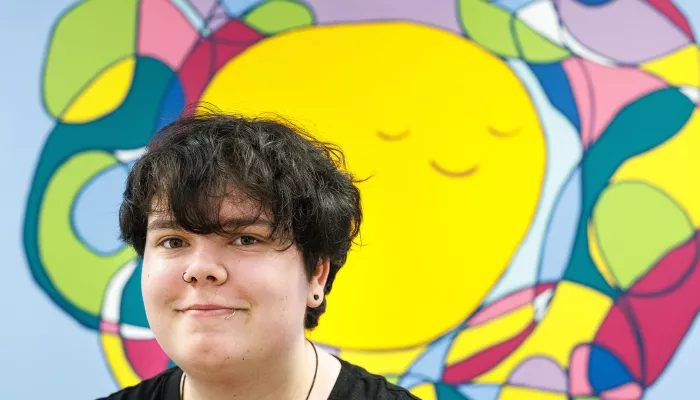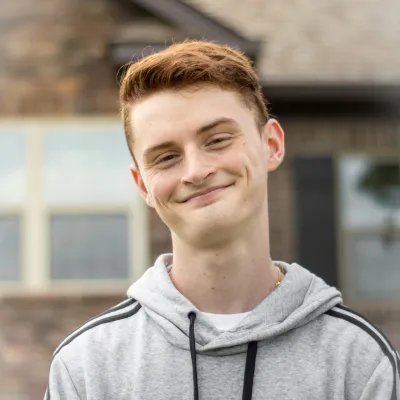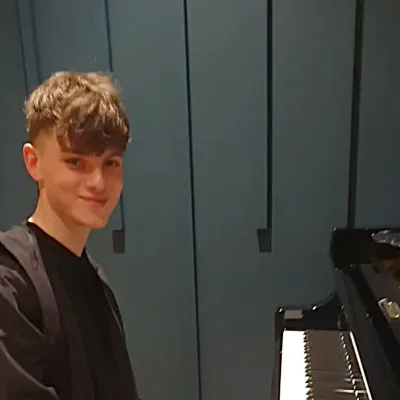Frankie (21), who is a neuro-divergent Trans man, has been in and out of homelessness since 2019. His precarious housing situation has meant he’s found himself in some inappropriate living situations, sometimes living with people much older than him who have taken advantage of his vulnerability. With Centrepoint’s support, Frankie is now in stable housing and feeling more settled, but it has been a long and difficult journey getting to this point and the future still feels uncertain.
Financial abuse
Frankie was financially abused by his flatmate after receiving backdated PIP payment and had to leave the flat share. Due to stress and impact on his health, he had to drop out of university. Things got so bad for Frankie that in October 2021, he tried to end his life by walking into oncoming traffic and ended up in hospital.
After some time in recovery, Frankie rang the Centrepoint Helpline for advice. On Christmas Eve 2021, Centrepoint were able to find Frankie emergency accommodation in a hotel. Frankie remembers feeling scared and anxious, but at least he had a roof over his head.
Food insecurity
Whilst in emergency accommodation, the 21-year-old often went to bed with an empty stomach. Food banks delivered to the B&B, but there were limited cooking facilities and the supplies quickly ran out. Until the next batch arrives, he survived on one meal at night and drank large glasses of water to get him through the day.
“I’ve gone to bed hungry multiple times a week, both sides of the pandemic. It was tricky for me. I was in recovery from addiction, and you need your strength for going through that.”
“Once the tins of spaghetti hoops or baked beans or pot noodles had run out, for the next five days or so, you eat at night, you drink big glasses of water and you go for walks.”
Frankie, who suffers with epilepsy and unstable mental health, is too unwell to work. He survives on universal credit and PIP – a benefit given to people with disabilities and long-term physical and mental health conditions. But the benefits he receives are increasingly not enough to cover the basic cost of living.
Forming friendships
However, despite the difficulties, once Frankie settled in to the B&B and started to make friends he managed to distract himself from his situation by playing games and filming videos with the other residents. “I made some unexpected friends at the hotel. We supported each other. We were all going through crisis, but we lifted each other’s spirits. Taking part in nostalgic activities with others definitely stopped me relapsing and I wouldn’t be here right now if that had happened.”
Finding appropriate accommodation
In May 2022, Frankie’s Centrepoint key worker was able to find him a room in semi-supported accommodation where he has started to rebuild his independence. As a trans-man, Frankie has been placed with two older women as he is still classified as female. Despite not feeling comfortable with still being classified as female and wanting things to change in terms of recognition of trans people, he feels unthreatened in this living situation. He has more space than he has had in a long time and gets on well with his housemates. He is also able to access Centrepoint's dedicated psychotherapy services for extra support with his mental health.
Frankie’s key worker Bethany says,
“Supporting young people in crisis can be challenging for a number or reasons, the main reason is the lack of suitable accommodation, especially for trans people. I explained to Frankie what to expect from the B&B and supported him throughout his journey. Frankie engaged well with the service, he understood how important this was and reached out to me when needed. It took almost six months to be able to move Frankie out of the emergency accommodation - this was no fault of his own and was due to the lack of accommodation and the volume of people needing support. It has been a pleasure to be able to support Frankie and it is has been lovely to hear he is settling in well to his accommodation and how much he appreciates the work Centrepoint does for young people in Manchester.”
Cost-of-living
For Frankie, although his housing situation is more stable, life is still a struggle. With costs continuing to rise, Frankie worries about the future and being able to get back into education one day.
“I feel very helpless, especially with the cost-of-living-crisis. I’m university educated, but I didn’t graduate due to my health issues and precarious living situation. I have those skills, and I don’t have any way to be able to harness them in my life. I’ve not got the energy levels to get out and do what I love. People who are in recovery want to be productive members of society, but they aren’t being given the means and tools to do that. I’m very frustrated.”
“I think more young people need financial literacy training more than ever at the moment with this cost-of-living crisis. We’re supposed to know how to manage our money, but we’re just not taught how to do it. If I didn’t have my PIP payments, I honestly don’t know how I’d survive through these times.




